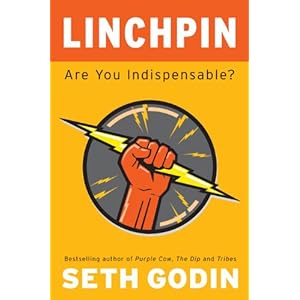 Phew! Another heartfelt call to action from business blogger Seth Godin to become indispensable.
Phew! Another heartfelt call to action from business blogger Seth Godin to become indispensable.
Author, public speaker, orthogonal thinker and internet marketing maven, Seth Godin makes a compelling case to the artist within us all to get off our backsides, ignore the risk averse “lizard brain” as he puts it, get creative, and give the gift of art. After all there is no way to win the “race to the bottom” wrought by commoditization of both product and labor.
Bear in mind, Godin uses “art” in its most widely used sense, not merely a canvas or a sculpture. Here, art is anything that its maker so creates; it may be a service just as well as an object. Importantly also, to be art it has to be given with the correct intent — as a gift (a transcendent, unexpected act that surpasses expectation).
Critics maintain that his latest bestseller is short on specifics, but indeed it should be. After all if the process of creating art could be decomposed to an instruction manual it wouldn’t deliver art, it would deliver a Big Mac. So while, we do not get a “7 point plan” that leads to creative nirvana, Godin does a good job through his tireless combination of anecdote, repetition, historical analysis and social science at convincing the “anonymous cogs in the machine” to think and act more like the insightful, innovators that we can all become.
Godin rightly believes that the new world of work is rife with opportunity to add value through creativity, human connection and generosity, and this is the area where the indispensable artist gets to create his or her art, and to become a linchpin in the process. Godin’s linchpin is a rule-breaker, not a follower; a map-maker, not an order taker; a doer not a whiner.
In reading Linchpin we are reminded of the other side of the economy, in which we all unfortunately participate as well, the domain of commoditization, homogeneity and anonymity. This is the domain that artists so their utmost to avoid, and better still, subvert. Of course, this economy provides a benefit too – lower price. However, a “Volkswagen-sized jar of pickles for $3” can only go so far. Commoditization undermines our very social fabric: it undermines our desire for uniqueness and special connection in a service or product that we purchase; it removes our dignity and respect when we allow ourselves to become a disposable part, a human cog, in the job machine. So, jettison the bland, the average, and the subservient, learn to take risk, face fear and become an indispensable, passionate, discerning artist – one who creates and one who gives.
